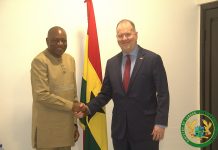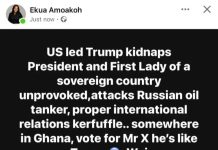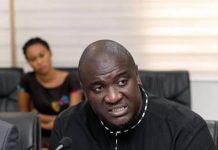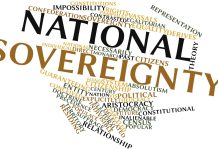Author: Samuel Nii Dowuona
It would appear that almost every policy decision any government implements in Ghana comes up against some resistance, often sponsored by interested parties who pretend to have integrity, but when it suits them, they employ underhand tactics to try and twist arms in their favour.
Even when government directed that telcos should quit putting expiry dates on data bundles, there was a pushback as if it was a bad policy. How bad could that be for consumers?
This time round, it is about the government’s policy decision to use a public-private partnership special purposes vehicle (SPV) to rollout s shared 4G/5G digital public infrastructure (DPI).
The intent is to ensure a concerted growth of the entire industry and accelerated spread of 4G/5G connectivity for all. How such a policy could generate so much noise as if it is a bad policy, beats my mind.
This policy comes amidst loud, clear and repeated unanimous chorus by all industry players, at various forums, including the recent 3i Africa Summit, that there is a need for shared infrastructure to grow the entire ecosystem and make it the main driver of accelerated development of the country and of the continent. So, the emerging noise around this new policy surprises me.
For starters, let me respond to a few issues that I was tagged with on Facebook ahead of the press conference by the Communications and Digitalization Ministry about the license for a single Wholesale 5G Network Provider to run an open access shared 5G infrastructure rather than auctioning spectrum to the highest bidders.
I am sure in the coming days we will all have answers to some of the emerging questions. But I am responding to these few ones because I was particularly tagged with them and I have some answers.
1. That the special purpose vehicle (SPV) created to hold the license for this shared 4G/5G digital public infrastructure (DPI) – NextGen Infrastructure Company (NGIC) was constituted just one week before they got presidential approval.
That is very true. But what is wrong with that, given that each of the entities that constitute the SPV have decades of very rich experience in their respective fields? All one needs to do is to check the names.
If you are not convinced, check their profiles. There is a lot I could say about SPVs, but it will make the write up too voluminous.
The alternative would have been to auction the license for individual entities, including telcos, to acquire them. But the question is, has any of the telcos in Ghana run a 5G network before? – No.
We can only depend on their experiences in running 2G/3G/4G networks. Similarly we can count on the rich experiences of the members of the consortium in the SPV to deliver on the mandate of this license, me thinks.
2. That the entire license was awarded to NGIC for a paltry US$6.25 million. That is not the case. The total cost of the license is above US$100 million. Even 4G license was sold for US$67.5 million in 2015.
The difference here is that the licensee has been given 10 years to pay the fee in instalments, unlike previously, when government demanded an upfront payment for licenses.
The reason is simply for the company to apply their initial funds as capex instead of using it all to pay for spectrum upfront.
Indeed, paying in instalments also means the funds will be available for future governments for development projects.
3. The issue about which local entities were selected to be partners in this venture is something I don’t exactly have answers to. But what I can say is that history shows that in selecting entities for special purpose vehicles of this nature, the consideration could be a mixture of competence and other variables.
Personally, I trust in the abilities of each of the partners, local and foreign, to deliver on their specific mandates. What other considerations went into their selection I wouldn’t know.
Having addressed those three issues to the best of my knowledge, let me state as early as possible that in principle, I, like all the telcos in Ghana, fully support the idea of a shared digital public infrastructure (DPI) as a panacea to fixing the telecoms/technology market imbalance in Ghana and driving a concerted growth of the industry.
My reasons are very simple and straight to the point:
For all the key industry licenses government, through the National Communications Authority (NCA), has issued in the past, they have always been by auction for the highest bidders.
This has left us with a very skewed telecoms and broadband industry market structure, where one player, MTN Ghana, the only significant market power (SMP), controls a huge chunk of 4G compliant spectrum, while one player, Telecel Ghana, is struggling with very limited 4G network, and the other, AT Ghana, has absolutely none.
What’s even worse is that several other players, mainly locally-owned broadband wireless access (BWA) licensees have crushed out of the market, specifically because MTN was unleashed on them after only three years of exclusivity, and most of their spectrum has been sold to, guess who, MTN Ghana.
MTN Ghana has grown so big that government was compelled to name them SMP in 2020, following a compelling article on the subject by this writer six months prior. Naming MTN Ghana SMP was a measure to correct the yawning market imbalance.
So, it would have been counterproductive to the whole correction process if the 5G compliant spectrum had also been auctioned to the highest bidders, knowing very well that the non-SMP telcos and other smaller ISPs may not have the financial muscle to acquire it at the stated price – over US$100 million.
Under the new regime, all the players are to contribute to paying for all the spectrum, and then they can each get specific capacities at much lesser prices and rollout both 4G and 5G networks across the country. Other entities, big and small, can in the future also acquire access directly from the NGIC at affordable rates.
It makes no sense for one player to acquire an overwhelmingly greater chunk of the spectrum (just because they have money), go ahead of everyone else, and then create a platform for everyone else to plug and play, so that they will make all the money in the name of creating a shared platform. That is not the best model of a shared infrastructure.
Unanimous Chorus
Speaking of shared infrastructure, at the Mobile Technology for Development (MT4D) forum during the just ended 3i Africa Summit in Accra, all the industry players, mainly MTN and Telecel, were very unanimous and emphatic in their chorus about the need to establish a shared digital public infrastructure (DPI) to drive the concerted growth of the industry.
Prior to that, at last year’s Mobile World Congress in Kigali-Rwanda, and also at the last Africa Prosperity Summit in Aburi-Ghana, all the speakers, include top executives of MTN, preached shared infrastructure at both country and continental levels.
I don’t want to believe any of the speakers meant that countries should pursue a model that puts controlling ownership in the hands of one telco to share with others.
I believe there is no better and equitable shared infrastructure model than the one jointly owned by all parties, which is what the government has done.
The 4G Mess and the Creation of a Monster
As a keen industry watcher and journalist, I have over the years watched and reported on how our industry regulator, under successive governments, had contributed immensely to worsening the imbalance in the market in exchange for money, while pretending to be fixing the imbalance with some cosmetic measures.
The regulator practically spent over a decade creating a monster, and now they are trying to use sticks and clubs to tame that monster, and so far, they have failed woefully.
This initiative to create a shared 4G/5G infrastructure is the biggest step I have seen in over a decade, towards addressing the yawning market imbalance.
Speaking of a monster, I have read what I think is a sound argument about the need to ensure we do not create another monster in a bid to tame an existing monster.
Indeed, there is value is creating a number of wholesale 5G service providers instead of just one. That model is likely to rake in more money for the state, I think.
But for starters, I strongly believe it is important for us to have a drastic shift in the industry, which is why I support the current single wholesale provider model to drive that drastic shift.
In the future, when we are sure the market imbalance is actually being cured, in the true sense of the word, we can make changes in the model and have multiple wholesale providers.
Before Telecel recently acquired the Vodafone Group’s 70% stake in Ghana Telecom in exchange for over US$150 million worth of liabilities and some assets, several other global telecom giants had showed interest in Ghana, but one thing had kept them off – the sheer size of the market leader and the risk it posed to any investment in Ghana.
Truth be told, the market leader invested heavily over the years to get to where it is now. So, one cannot begrudge them for their market position. But for a regulator or government that claims to be interested in the growth of the entire industry, money should not be the main factor in deciding who gets what.
The money narrative needed to have changed from the time 4G licenses were being allocated in 2015, but the regulator and government rather ended up using 4G license sale to destroy the market even further.
In fact, they even overpriced the license to raise money for another project – digital terrestrial transition project. Then subsequently, they sold more 4G spectrum to the market leader even after it has been named an SMP. Who does that?!
However, in the words of the Minister of Communications and Digitalization, Ursula Owusu-Ekuful, the decision to establish a shared infrastructure this time round, was largely informed by the need to grow the entire industry instead of making money off industry players who can pay, as has been done in the past. That is refreshing for me as a keen industry watcher and journalist for over two decades.
In 2021, MTN Ghana announced their readiness to roll out 5G in 2022, saying that they had prepared over 1,300 cell sites across the country for the purpose.
Clearly, they would have loved to, again, take the lead in 5G rollout in Ghana, and make the usual boast as the first to go 5G.
But for once we have a caring Minister; a politician who is thinking about, and is actually taking effective steps for the growth of the entire industry rather than just giving licenses to the highest bidders to raise moneys for the next election or some selfish political purpose.
And take note that this time round, the government is not even insisting on collecting the entire licensing fee upfront.
That is a very big difference from the status quo. A greater part of the money is being left for subsequent governments.
I strongly believe we are onto something big and it will be in the interest of all industry players, including the market leader to get involved and make it work for the common good of Ghanaians.
It will serve no one’s interest if any telco plays delay tactics in the expectation that they will negotiate for a bigger chunk of the cake or manage to get a separate arrangement for themselves outside of this shared platform.
I don’t want to believe that a particular telco is for instance pushing to get 30% stake in the whole deal, and that they have employed the services of a popular politician (name withheld) to lobby on their behalf, while pretending to be playing fair and upholding the tenets of integrity.
NDC Manifesto Promise
It is important to also state at this point that very often when one government implements a certain public interest policy, some interested parties think they can get a subsequent government to change the policy in their favour.
This is why it is refreshing to note that, in the 2020 Manifesto of the biggest opposition party, National Democratic Congress (NDC), they espoused a similar policy, which they would have implemented by now, had they won the 2020 elections. It is almost as if the sitting government borrowed the policy from the NDC.
Anyone who cares to know can check Section 8.6, subsections (b), (l) and (n), on Page 98 of the NDC’s 2020 Manifesto. This gives me confidence that an NDC government will not botch this policy as some may think. The worst the can do is to tweak it, maybe, but in principle, it is inline with their 2020 Manifesto promises.
Genuine Concerns
1. There are a few genuine concerns regarding which 5G kit will be used, given that there are major security concerns about Huawei 5G kit elsewhere in the world.
2. Who would the NCA hold responsible for quality of services issues, when they happen – would it be NGIC or the individual service providers?
Those issues and others will be looked at in detail in the coming days.
We leave it here. But let me share a few facts with you before I go:
• The spectrum price as given to the licensee is not US$6.25 million. It is over $100 million but they are paying in small instalments over the next ten years.
• Government is holding 7.5% shares in the NextGen Infrastructure Company (NGIC), while the three telcos have been offered 25% total, with the remaining 67.5% held by the five other partners, who are the main financiers of the project.
• The company has been allocated 200MHz in the 3.5MHz spectrum band for 5G, 40MHz in the 2.6MHz band (the type that was allotted to the BWAs) for 4G, and 2x10MHz in the 2.1MHz band, also for 4G, all for a 10-year licensing period before renewal on May 4, 2034.
• The private partners in the consortium are Nokia (Finland), Tech Mahindra (India), Radisys (India), K-NET (Ghana), Ascend Digital (Ghana), AT Ghana, Telecel Ghana and soon MTN Ghana will join.








































